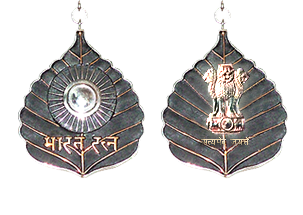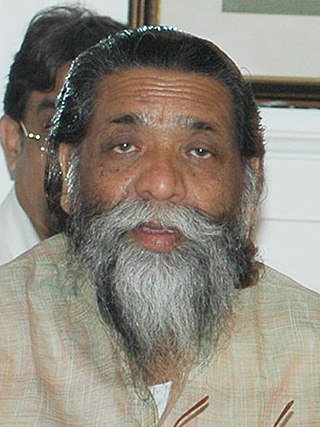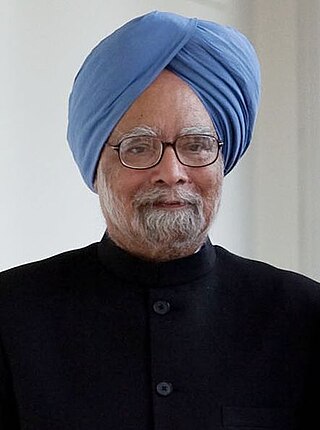
Jammu and Kashmir was a region formerly administered by India as a state from 1952 to 2019, constituting the southern and southeastern portion of the larger Kashmir region, which has been the subject of a dispute between India, Pakistan and China since the mid-20th century. The underlying region of this state were parts of the former princely state of Jammu and Kashmir, whose western districts, now known as Azad Kashmir, and northern territories, now known as Gilgit-Baltistan, are administered by Pakistan. The Aksai Chin region in the east, bordering Tibet, has been under Chinese control since 1962.

The Bharat Ratna is the highest civilian award of the Republic of India. Instituted on 2 January 1954, the award is conferred in recognition of "exceptional service/performance of the highest order", without distinction of race, occupation, position or gender. The award was originally limited to achievements in the arts, literature, science, and public services, but the Government of India expanded the criteria to include "any field of human endeavor" in December 2011. The recommendations for the award are made by the Prime Minister to the President. The recipients receive a Sanad (certificate) signed by the President and a peepal leaf-shaped medallion. Bharat Ratna recipients rank seventh in the Indian order of precedence.

Mary Teresa Bojaxhiu MC, better known as Mother Teresa, was an Albanian-Indian Catholic nun and the founder of the Missionaries of Charity. Born in Skopje, then part of the Ottoman Empire, she was raised in a devoutly Catholic family. At the age of 18, she moved to Ireland to join the Sisters of Loreto and later to India, where she lived most of her life and carried out her missionary work. On 4 September 2016, she was canonised by the Catholic Church as Saint Teresa of Calcutta. One of the miracles that were a prerequisite for her canonisation has been challenged. The anniversary of her death, 5 September, is now observed as her feast day.

Taruvai Subayya Krishnamurthy is a former Indian Revenue Service officer who served as 13th Chief Election Commissioner (C.E.C) of India. His main assignment as C.E.C was to oversee the 2004 elections to the Lok Sabha. He had earlier served in the Election Commission of India as a commissioner since January 2000.

Shibu Soren is an Indian politician who is currently member of Rajya Sabha representing Jharkhand and the leader of Jharkhand Mukti Morcha. He formerly served as 3rd Chief Minister of Jharkhand, first in 2005 for 10 days, then from 2008 to 2009 and again from 2009 to 2010. He is also the President of the Jharkhand Mukti Morcha (JMM) political party, a constituent of the INDIA Alliance. He was the member of Lok Sabha from Dumka from 1980 to 1984, 1989 to 1998 and from 2002 to 2019 and Minister for Coal in the Union Cabinet from 2004 to 2004, 2004 to 2005 and from 2006 to 2006, when a Delhi district court found him guilty in the murder of his private secretary Shashi Nath Jha in 1994. He has also been indicted in the past on other criminal charges.

Bhumika Chawla is an Indian actress who primarily works in Telugu films along with a few in Hindi and Tamil. Chawla made her acting debut with the Telugu film Yuvakudu (2000). Chawla is best known for her role as Nirjara Bhardwaj in the film Tere Naam alongside with Salman Khan.

Omar Abdullah is an Indian politician who is currently serving as the Chief Minister of the union territory of Jammu and Kashmir. He had previously served as the chief minister of the state of Jammu and Kashmir between 2009 and 2014, and is the current vice president of the Jammu and Kashmir National Conference, a position he has held since 2009. Abdullah also served as a member of parliament in the Lok Sabha from 1998 to 2009, representing the Srinagar parliamentary constituency, and was a union minister of State for External Affairs.
In India, President's rule is the suspension of state government and imposition of direct Union government rule in a state. Under Article 356 of the Constitution of India, if a state government is unable to function according to Constitutional provisions, the Union government can take direct control of the state machinery. Subsequently, executive authority is exercised through the centrally appointed governor, who has the authority to appoint other administrators to assist them. The administrators are usually nonpartisan retired civil servants not native to the state.

The Chief Election Commissioner of India (CEC) heads the Election Commission of India, a body constitutionally empowered to conduct free and fair elections. An election commissioner is appointed by the President of India on the recommendation of a three member selection committee headed by the Prime Minister of India and senior most election commissioner is appointed as chief election commissioner. The term of a CEC can be a maximum of six years or till he/she attains sixty five years of age. The Chief Election Commissioner is usually a member of the Indian Civil Service and mostly from the Indian Administrative Service.

Priya Ranjan Dasmunsi was an Indian National Congress politician, former Union Minister and a member of the 14th Lok Sabha of India. He represented the Raiganj constituency of West Bengal. He died on 20 November 2017, aged 72, after nine years in a coma following a massive stroke.

Salman Khurshid Alam Khan is an Indian politician, designated senior advocate, eminent author and a law teacher. He was the Cabinet Minister of the Ministry of External Affairs. He belongs to the Indian National Congress. He is a lawyer, and a writer who has been elected from Farrukhabad Lok Sabha constituency in the General Election of 2009. He belongs to the Farrukhabad area. Prior to this he was elected to the 10th Lok Sabha (1991–1996) from the Farrukhabad Lok Sabha constituency. He became the Union Deputy Minister of Commerce in June 1991, and later became the Union Minister of State for External Affairs. He started his political career in 1981 as an Officer on Special Duty in the Prime Minister's Office (PMO) under the prime ministership of Indira Gandhi.

Nikhil Kumar is a former IPS officer-turned politician hailing from Bihar who was Governor of Nagaland from 2009 to 2013 and Governor of Kerala from 2013 to 2014. One of country's well knownIPS officers of 1963 batch from the AGMUT Cadre Kumar also served as DGP of the National Security Guards, Indo-Tibetan Border Police, Railway Protection Force and Commissioner of Delhi Police. He was elected member of the 14th Lok Sabha of India from 2004 to 2009, representing the Aurangabad constituency in Bihar as a member of the Indian National Congress (INC) political party. He also served as the Chairman of the Parliamentary Committee on Information Technology.

General elections were held in India in five phases between 16 April 2009 and 13 May 2009 to elect the members of the fifteenth Lok Sabha. With an electorate of 716 million, it was the largest democratic election in the world until being surpassed by the 2014 general election.
Events in the year 2009 in the Republic of India.

N. Gopalaswami, served as 15th Chief Election Commissioner of India (CEC) and has been awarded the Padma Bhushan in 2015. He is a 1966 batch Indian Administrative Services officer belonging to the Gujarat cadre. He took over the charge of CEC on 30 June 2006 and retired in April 2009. He is currently the president of Vivekananda Educational Society which runs a group of schools in and around Chennai. He was appointed as the Chairman of Kalakshetra for a term of five years starting from 22 October 2014, until 2019.

Shahabuddin Yaqoob Quraishi is an Indian civil servant who served as 17th Chief Election Commissioner (CEC) of India. He was appointed as the CEC as the successor to Navin Chawla on 30 July 2010.

Veeravalli Sundaram Sampath served as 18th Chief Election Commissioner (CEC) of the Election Commission of India from 2012 to 2015. He succeeded S. Y. Quraishi as the Chief Election Commissioner on 11 June 2012. Born on 16 January 1950, Sampath retired on 15 January 2015 when he attained 65 years of age.

The Election Commissioners of India are the members of Election Commission of India, a body constitutionally empowered to conduct free and fair elections in India. An election commissioner is appointed by the President of India on the recommendation of a three member selection committee headed by the Prime Minister of India. The term of an election commissioner can be a maximum of six years or till he/she attains sixty five years of age. Election Commissioners are usually members of the Indian Civil Service.

The Election Commission of India (ECI) is a constitutional body established by the Constitution of India empowered to conduct free and fair elections in India. The Election commission is headed by a Chief Election Commissioner and consists of two other Election Commissioners.

Rajiv Kumar is a former Indian Administrative Service officer. On 15 May 2022, he assumed the charge as the 25th Chief Election Commissioner of India, succeeding Sushil Chandra.

















